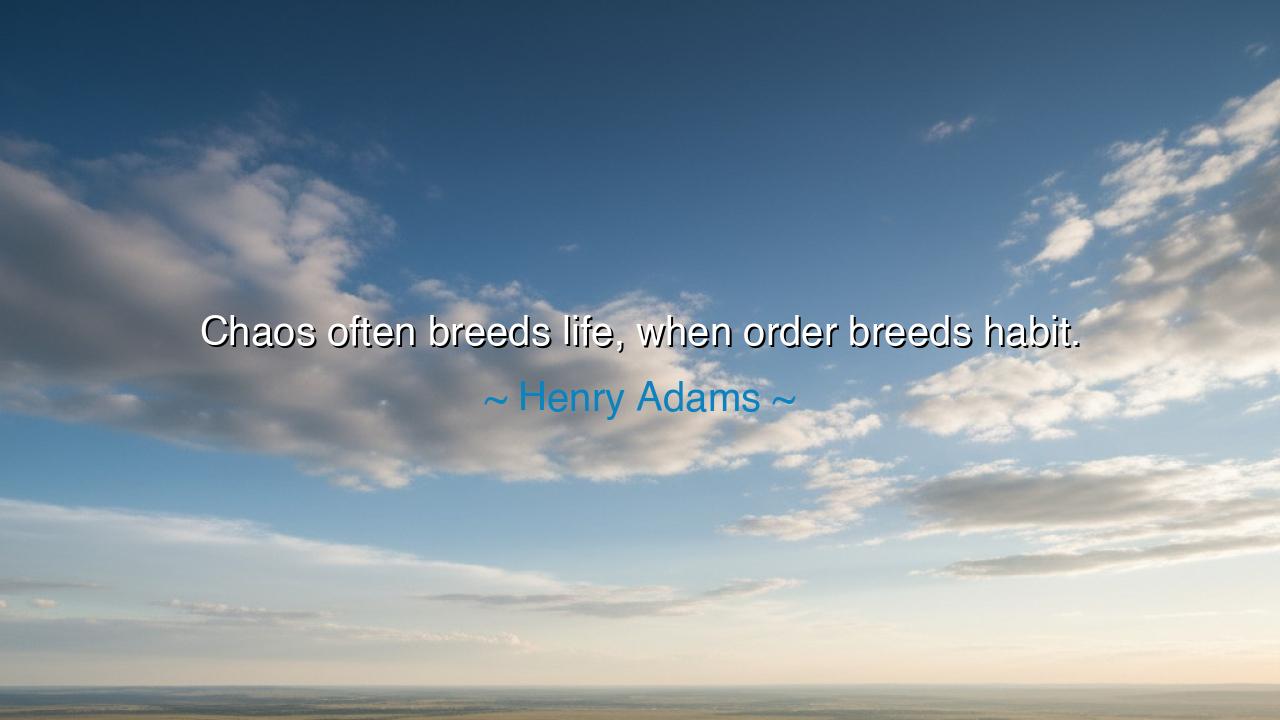
Chaos often breeds life, when order breeds habit.






“Chaos often breeds life, when order breeds habit.” — Henry Adams
There are moments in every age when the firm stones of order tremble, when the patterns that once sustained life begin to decay. In such times, men grow fearful, clinging to what is known, mistaking comfort for wisdom. Yet Henry Adams, historian and philosopher of restless intellect, reminds us that it is not always order that gives birth to greatness, but chaos. For when the world is broken open, when old ways dissolve and certainties die, life itself finds a way to begin anew. Out of disruption, creation arises; out of confusion, possibility blooms. Such is the paradox of existence — that the storm which destroys also clears the ground for what must come next.
To understand Adams’ wisdom, one must know the man himself — a descendant of presidents, born into order, yet forever in search of meaning amid the turbulence of the modern age. He lived as the old world gave way to the new: the Industrial Revolution roared, machines conquered silence, and faith bowed to science. In this shifting landscape, Adams saw that civilization’s vitality came not from the security of habit, but from the raw energy of change. Where order lulls the soul into repetition, chaos awakens it to creation. He understood that too much harmony breeds stagnation, but from the clash of forces — from struggle, invention, and rebellion — new life emerges.
The ancients knew this truth long before Adams gave it words. When Prometheus stole fire from the gods, he sowed chaos among the heavens — yet from that chaos came the dawn of human progress. When Athens fell to tyranny, its people rose to craft democracy. When Rome burned, it did not perish, but transformed. History itself is a living testament to Adams’ insight: the order of one age always collapses into the chaos that births the next. Nature, too, whispers this lesson — forests burn, but from their ashes springs new growth; rivers flood, yet leave behind fertile soil. Thus, chaos is not the enemy of life, but its secret companion.
Consider the story of the Renaissance, born from the ruin of the Middle Ages. Europe lay shattered by plague, its institutions weakened, its faith questioned. Yet from that chaos came the explosion of art, science, and human imagination. Michelangelo carved divinity into stone, Galileo measured the stars, and Da Vinci bridged the gap between body and spirit. The old order had grown weary, its habits too rigid to contain the fire of the human spirit — and so it fell, making way for rebirth. Without the turmoil of the past, there would have been no Renaissance, no awakening, no expansion of the human soul.
Order, though noble, can be dangerous when it becomes worshipped. For in the comfort of routine, the mind sleeps. Habit is the slow death of wonder. A society that fears chaos becomes sterile — safe, perhaps, but lifeless. Yet one must not despise order entirely, for it is the vessel that carries the creative flame. The wisdom lies in balance: too much chaos, and the world dissolves into ruin; too much order, and the world calcifies into monotony. Like the tides that pull between storm and stillness, life demands both motion and form, both the wild and the steady.
The lesson is this: do not fear chaos, for it may be the herald of your awakening. When your plans collapse, when life’s patterns shatter, remember that within disorder lies the seed of renewal. Habit binds the spirit; chaos frees it to rediscover its purpose. When the familiar crumbles, do not despair — build again, but build differently. Let uncertainty be your teacher, and let transformation be your craft.
So, my children, when you stand amid the wreckage of what once was — whether in your life, your work, or your world — do not cling too tightly to the past. The gods themselves create through destruction. Trust the tempest, for within its swirling depths lies the pulse of creation. For truly, as Henry Adams wrote, “Chaos often breeds life, when order breeds habit.” And in that paradox lies the eternal rhythm of existence: that every end conceals a beginning, and every fall conceals the wings of flight.






AAdministratorAdministrator
Welcome, honored guests. Please leave a comment, we will respond soon